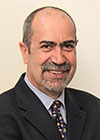Program born at SF State works to re-train immigrants as doctor shortage looms

“I found a place and a space to develop an idea that is very dear to me,” said Associate Professor of Health Education José Ramón Fernández-Peña, who is retiring after almost 20 years at SF State. His Welcome Back Initiative has worked with 16,000 foreign-trained health professionals from 167 countries.
José Ramón Fernández-Peña says U.S. should make it easier to utilize foreign-trained health professionals
By Matt Reed
With the upcoming wave of retiring Baby Boomers, the United States faces a shortage of a half-million nurses and a quarter-million doctors by 2030, and filling up graduate schools or cranking up training programs simply won’t bridge that gap.
That’s according to San Francisco State University Associate Chair and Associate Professor of Health Education José Ramón Fernández-Peña. But one seemingly easy solution could help with the shortage: re-train and certify the thousands of immigrants and refugees living in the United States who were educated in the health care field in their home countries.
“A physician who is driving a taxi. A nurse who is working at McDonald’s. That is brain waste,” Fernández-Peña said recently in his office. “We have the ability to tap that knowledge, that set of skills, and put it to work. But we’re not facilitating that process.”
To address this issue, Fernández-Peña founded the Welcome Back Initiative in 2001, just a few years after arriving at SF State. The innovative, award-winning program has since worked with 16,000 foreign-trained health professionals from 167 countries, providing them with English language instruction and advising them on how get licenses and credentials so that they can enter the U.S. health care workforce. Fernández-Peña himself is a trained doctor who came to the U.S. from Mexico in 1985.
“It’s unfathomable that an individual who may have been the foremost heart surgeon in Sweden or in Mexico or in Togo has to start practically from zero.”
Now, Fernández-Peña is preparing for to retire from SF State. But he still sees the same obstacles facing foreign-trained doctors and nurses, many of whom fled their home countries because of war, famine or political strife. They find that getting re-licensed in the U.S. can take years, and only after meeting stringent requirements written by state professional associations who are “very protective of their turf,” Fernández-Peña said.
“I think it’s a completely idiotic process. It’s a complete waste of people’s experience, talent and expertise,” he said. “It’s unfathomable that an individual who may have been the foremost heart surgeon in Sweden or in Mexico or in Togo has to start practically from zero.”
The Welcome Back Initiative was originally a partnership between SF State and City College of San Francisco. It has since opened centers in San Diego, Boston, New York and seven other cities or regions. The initiative has never done any advertising but is nearly always overloaded with requests for help from recent immigrants — an indicator that there is a large number of trained professionals who haven’t been utilized.
“The trick question that remains true today is: How many folks are out there? Nobody knows,” he said. “But it is completely stupid to pass up this opportunity. These are individuals who could be taking care of children with asthma instead of working at a car wash.”
The Migration Policy Institute (MPI), a nonpartisan think tank that focuses on improving the integration of immigrants in the U.S., believes more than 2 million highly skilled professionals are living in the U.S., a number that also includes engineers, attorneys, accountants and others outside the health care field. Fernández-Peña called that a good estimate, adding that the number could be even higher.
In addition to doctors and nurses, the aging U.S. population will also need many more dentists, mental health professionals, social workers and public health workers. The Welcome Back Initiative often guides immigrants who were physicians in their home country into the public health field, partly because it is quicker and easier to get the necessary training and certification.
San Francisco Department of Public Health program manager Alberto Pérez-Rendón is a good example of the kind of career path that foreign-trained medical workers can take in the U.S., Fernandez-Pena said. Pérez-Rendón was a medical doctor in Mexico, then came to the U.S. and eventually earned his master’s degree in public health at SF State. He’s also worked as a program director for Asociacion Mayab, a San Francisco nonprofit that helps Mayan immigrants.
“What we have seen in our program is a fairly low success rate in entering residency training programs,” Fernández-Peña said. “But we found that our participants are highly successful in entering other related health professions where the need is just as great and just as important.”
Fernández-Peña said the Welcome Back Initiative’s work will continue — a strategic planning retreat will be held this fall to figure out next steps for leadership of the organization, and the program is scheduled to be featured on the program “CNNgo” next month. Meanwhile, he’s looking ahead to life after SF State.
“It has been an amazing ride here,” he said. “I found a place and a space to develop an idea that is very dear to me.”
Republished from SF State News